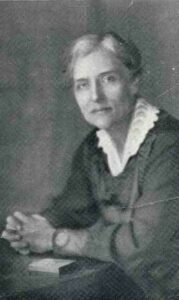Dr. Gertrude Buck
By Jo Ellyn Clarey, 2007
Rhetorician and education reformer Gertrude Buck was inspired by Progressive Era scientific and social theories at the turn of the twentieth century. From the time she left her native Kalamazoo for an education at The University of Michigan and a professional life at Vassar College, Buck lived on the cusp of a changing academic world. She pioneered a student-centered pedagogy emphasizing continuity and sequence in educational planning—matters taken for granted today—and was instrumental in forming what was then a radical approach to composition education. Gertrude Buck developed what she called a social theory of discourse and experimented with what today we call “interdisciplinarity.” She was alert to the ways in which new fields of study— psychology, anthropology, sociology—would open up her own much older field, and she moved rhetorical study into the new century.
In 1898 Gertrude Buck became the first woman to achieve a Ph.D. in rhetoric at The University of Michigan. Nearly one hundred years later in 1984 the Rhetoric Society Quarterly officially recognized Buck’s work as having paved the way for modern rhetoric studies and the beginnings of a female-centered rhetoric. In a time when more and more women were entering college classrooms, Buck was unique in her discussion of women’s emerging roles in a patriarchal society. Her female students at Vassar received strong signals from her writings and from her personal model that the “new” intellectual woman could write creatively, think critically, and argue persuasively regardless of her role in life. It is not surprising that turn-of-the-century Vassar graduates began showing “social compunction” and an “intense sense of social obligation” after exposure to Buck’s social theories of discourse.
While Buck successfully taught rhetoric as a democratic, equalizing activity, as a means to social advancement for women and men of every class, her primary goal was to lay claim to a new tradition for others of her sex. She saw writing not simply as a scientific activity but as part of a public social activity that would help prepare women for democratic citizenship. (She did the bulk of her work prior to the universal enfranchisement of women.) Buck’s attention to the complexity of language paralleled the complexity of social relationships that she always saw at the center of language. It was especially important, then, that Buck’s educational and communication theories underscored ways that could enable her female students, making them clearer thinkers, better organizers, and better communicators. Examples in her books illustrated that women had a history of importance in art, literature, history, and politics; and her theories directly touched the lives of such students as anthropologist Ruth Benedict and cultural historian Constance Rourke. At Vassar, Rourke found herself among a large company of privileged daughters from Grand Rapids sent to be shaped by Gertrude Buck’s ideas.
Central to Buck’s educational efforts were her several textbooks for composition classes; but even before the publication of her best known work, The Social Criticism of Literature, in 1916, she
had also published three books reflecting her interests in psychology, education, and literary criticism, as well as books of poetry and plays and numerous reviews in national publications. Flouting stereotypes about academics, Buck led part of her larger social life beyond the Ivory Tower by founding a drama-writing workshop that in 1919 became the Poughkeepsie Community Theatre.
Living and working in an era when women were questioning their social subordination, Buck was a pioneer and model among women educators attempting to bend a rigid system. In the classroom and in her textbooks, Buck encouraged a clearer understanding of how language and society are interdependent and challenged educators to recognize that social factors are inextricably bound to individual expression, that writing is a social action and communication is a community experience. In our own time scholars in the fields of rhetoric and composition have rediscovered Buck, appropriating her theories for enlightened current communication and textual criticism. Moreover, this developing body of scholarship has acknowledged her theories of rhetoric as keys to her ideas of equality and freedom, essential concepts motivating women at the turn of the century as well as today.
Sources
This biography can also be found in the Fall 2007 GGRWHC Newsletter.
Gertrude Buck’s Michigan Women’s Hall of Fame Biography
This essay is based in large part on the work of Grand Rapids scholar Vickie E. Ricks, author of Revisioning Traditions through Rhetoric: Studies in Gertrude Buck’s Social Theory Discourse.
Vassar. “Gertrude Buck.” Vassar Encyclopedia, 2006. https://vcencyclopedia.vassar.edu/faculty/prominent-faculty/gertrude-buck/.

